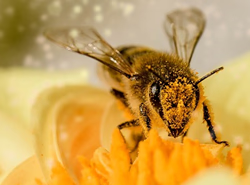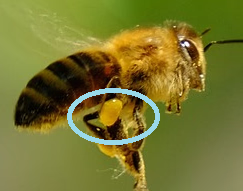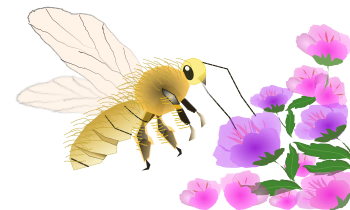Bee Pollen
What is bee pollen ? Who can eat bee pollen ? How do you eat bee pollen ?
Explore the science behind health benefits of bee pollen.

What is Bee pollen ? To find out, meet Ms. Buzzgal, a worker bee and an expert pollinator. Every day Ms.Buzzgal travels a mile around the hive collecting pollen from flowers.
Flying builds up static electric charges on her body. Static electricity is caused by friction. It makes pollen stick to her as she lands on male flowers. Hovering from flower to flower, she is covered with pollen dust. When she visits female flowers, some pollen rubs on to the flower, pollinating it. There is still a lot of pollen left on her.
Animals lick and groom themselves, so does Ms.Buzzgal. She combs herself with hairs on her legs, rolling the pollen dust in to a ball. She licks herself clean and packs the ball tight using saliva and enzymes. Special hairs on her legs prick the hard pollen ball, holding it in place during her flight back to the hive.

Is collecting bee pollen bad for bees ?
Nectar collecting bees return to the hive with nectar, while pollen experts like Ms. Buzzgal bring back fresh pollen. Bees eat both nectar and pollen. Nectar gives carbohydrates and energy. Pollen has essential nutrients for good health.
At the hive, Ms.Buzzgal deposits her pollen ball into empty cells of the honey comb. It is packed with nectar,
saliva and sealed off with honey. Left untouched for days, bacteria ferment it into bee bread.
Bee bread is packed with micro-nutrients. Unlike adult bees, larvae (baby bees) cannot digest fresh pollen.
They rely on fermented pollen in bee bread for nutrients.
Bee pollen vs flower pollen
Bees collect pollen from different types plants for a balanced dose of nutrients. Bee pollen has many different flavanoids and micro-nutrients. Bees use nectar and honey to roll the pollen in to a ball. This makes bee pollen rich in carbohydrates and proteins.
Bee Pollen Benefits
Bee Pollen is packed with nutrients. It has anti-oxidants, minerals and vitamins. Adding bee pollen to smoothies or cereals
makes it healthy.
Does bee pollen help grow breasts? Is it good for women? Does bee pollen aid weight loss ?
Bee Pollen for breast growth
There is not enough data to prove bee pollen helps breast growth. Instead, it has many different nutrients packed
in small balls. Bee pollen is a healthy food additive. As of today, scientific data shows it is safe to eat bee pollen in small doses
not more than a teaspoon every day. Children, pregnant women, and people with allergies to bee products are advised not to eat
bee pollen.
Nuterients in bee pollen are available in traces only. We do not have enough data to prove that such small amounts make an impact on
human health.

Bee Pollen vs Royal Jelly vs Bee Bread
Bee Pollen is pure, raw pollen from flowers mixed with traces of honey and bee enzymes. Royal Jelly and Bee bread are different from pollen. They do not have high amounts of raw pollen.
Bee Pollen Nutritional Facts
Nutritional content of bee pollen varies based on the flowers it comes from. So, nutritional content of pollens vary from season to season, and flowering plants available around the hive. This list published by the US Department of Agriculture has an overview of nutritional content of bee pollen.
Bee Pollen Allergies
To find out if you are allergic to bee pollen, start by taking 1/4 teaspoon for the first few days. If it does not cause itches or shortness of breath, increase your intake proportionally.
Is Bee Pollen Vegan
Pollen is a vital food for bees. When pollen levels go down, bees change their working pattern to collect less nectar and make up for the loss in pollen. Harvesting bee pollen regularly impacts the bee hive.
Vegans avoid bee pollen because of its environmental impact. Bee pollen is a rich source of nutrients. Including a variety of fruits
and vegetables in your diet ensures you do not miss out on these nutrients.
Otherwise, an occasional sprinkling of bee pollen on smoothies or cereals adds a healthy dose of micro-nutrients.
